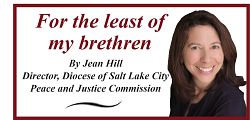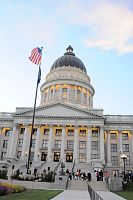Learn the Catholic Way to 'Meddle in Politics'
In 1998, I made my first foray to the Utah Legislature to advocate on public policies. In my zeal for the positions I took on behalf of my employer at the time, I found myself losing sight of the legislative process, which involves flawed human beings working together to find solutions to complex problems. Those who disagreed or appeared to actively thwart our efforts became to me little more than obstacles in the way – obstacles with ill intent, in my jaded view at the time.
Since then, I have come to know many legislators on a more personal level. Thanks to my current employment, I also have a very different perspective on political issues. Combined, these experiences have helped me understand that we are all better off as people living in a shared environment when we recognize that party platforms are not Gospel, but care for our fellow man and woman is.
Approaching advocacy from that Gospel truth has taught me many lessons. The more important lessons learned through almost 20 years of advocacy include:
– Legislators are people. Like all of us, they do great things and incomprehensible things. They have good ideas and bad, all of which are subject to improvement with input from others who have different, relevant experiences. Most, if not all, of our legislators are actually quite likable. Most will share some areas of common interest or concern. Finding those issues where we share a similar interest takes learning about each other as individuals and respecting each other as such. We may disagree vehemently on a policy, but we all start and end each day as fellow human beings.
– Despite what you may have heard, in general, Democrats do not want to kill babies and Republicans do not hate the poor. While some members of each party may espouse personal views consistent with those stereotypes of their parties, behind the political positions are usually deep concerns about how best to make our city, county, state, or nation better. Most elected officials I have encountered, regardless of party affiliation, grieve for women who choose abortion. Most want to help those who live in poverty. Party affiliation may color what they view as potential solutions to these issues, but both sides of the aisle genuinely want to help women in crisis and people in poverty. We may disagree with their chosen solutions, but we cannot assume their reasons for supporting any specific piece of legislation is diabolical.
– The Social Doctrine of the Catholic Church provides a solid basis for approaching political issues. Our teaching is grounded in Scripture; thus, it withstands political tides and whims and provides a moral base from which to address just about any political question. Catholic social teaching does not provide easy answers. Rather, it serves as a reliable guide to sound decisions that best promote the common good. From seemingly mundane budget decisions to questions of obvious moral import, such as the death penalty, Catholic teaching asks us to approach solutions more thoughtfully, thoroughly and with far more of a focus on the dignity and sanctity of every life than any political platform.
We Catholics are called to participate in our political system. As Pope Francis said, “None of us can say, ‘I have nothing to do with this, they govern. ...’ No, no, I am responsible for their governance, and I have to do the best so that they govern well, and I have to do my best by participating in politics according to my ability. Politics, according to the Social Doctrine of the Church, is one of the highest forms of charity, because it serves the common good. ... A good Catholic meddles in politics, offering the best of himself, so that those who govern can govern. ”
Learning to meddle the Catholic way is the first step to advocacy that serves the common good. The Diocese of Salt Lake City Peace and Justice Commission will provide training in Catholic advocacy on Jan. 13 at the Pastoral Center, just in time for the 2018 Utah legislative session. Registration for this free event will open soon, so please watch for more information on the diocesan website and Facebook page, and the Around the Diocese section of this newspaper.
Jean Hill is the director of the Diocese of Salt Lake City Peace & Justice Commission.
© Copyright 2024 The Diocese of Salt Lake City. All rights reserved.



Stay Connected With Us